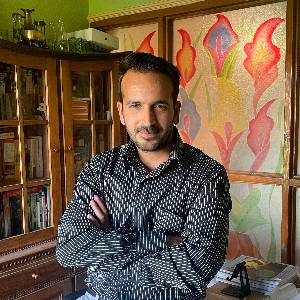“The history of all hitherto existing society is the history of class struggle”. Karl Marx’s profound outlook on human relations became the defining narrative of the 20th century. The storm that Marxist ideas raised tore down Russia’s well-entrenched social institutions, including Christianity. But little did the world know, that the germs of the Russian Revolution were inoculated into human thought by Christianity itself. This was until we were schooled by historian Tom Holland, who through his deeply analytical 2019 book Dominion brings forth a spectacular study of the Western mind and how it was informed by Christianity.
Until the arrival of Christ, the Western world glorified the ancient Greek and Roman gods for their exceptional might, magnanimity, cruelty and sexuality. In these virtues, the Western world saw the representations of divinity. Whether it was Zeus’ command of thunder and lightning or Poseidon’s reign over the sea, it was these larger-than-life powers that suffused the Western religious mind with awe and submission. Being divine was by its very nature being powerful. In such a society, it was the mighty that possessed the natural aura of sacredness, while the vast majority of the weak and the servile were predestined to be consumed by their desires, or at best to be ignored in the squalid back-alleys of their ancient cities. This was the arrangement preordained by divinity.
But with the arrival (and martyrdom) of Christ, a new idea of divinity arose. God himself had come down to live among and die the death of the poorest, weakest and slavish of humans. The spark of divinity had been struck for the first time amongst a class of ordinary mortals, and not the strong and powerful. Divinity for the first time lay in poverty, servility, lowliness and meekness. Divinity for the first time, did not reign over wars, famines and plagues, but conceded a death of ignominy. Divinity lay not in the cherished ideal of vengeance, but in turning the other cheek! It lay not in the luxurious overflowing garbs of the royalty, but in the humble seamless robe of a captive.
And thus the spotlight began to shine on the hitherto obscure –– the poor and the landless became God’s chosen. “The rich man” on the other hand, “shall hardly enter into the kingdom of heaven”. From this newfound dynamicity of human relationships emerged all the values that we have come to cherish –– kindness, humanity, equality. The strong began to consider it their responsibility to fend for the poor. The weak were no longer to be cast out but accommodated into the mainstream of society, as brethren in faith and humanity –– whether they were the black slaves of the Caribbean or slum-dwellers of Calcutta. Christianity wrapped a warm blanket of benevolence to protect them from the cold blizzard of natural law wherein strong alone were destined to persist.
The significance of Christian values could however only be appreciated in contrast. In 20th-century Europe, the veneer of Christian humanity would melt away with the rise of Nazism. Nazi ideology was cooked in the broth of a new age flavoured by ideas like those of Charles Darwin. His hypothesis of Natural Selection left no scope for reverence for the weak creature. Often very harshly, nature would find a way to weed them out and propagate only the best breeds ahead. This idea when applied to the human realm mocked the Christian benevolence and glorification of weakness. The proponents of Social Darwinism instead considered the weaker humans –– the disabled, the homosexuals, the gypsies and of course the Jews, as a great blight of humanity which must be weeded out with urgency. Suddenly, the European order shaped and cemented by Christianity fell apart at the behest of Nazism and descended into a grotesque onslaught of raw natural science in the human sphere. The flames of the Holocaust consumed Europe and a foul stench arose from the death of long-held Christian values.
All this was somewhat prophesied by one of the Western world’s deeply controversial thinkers, Frederich Nietzsche. When he proclaimed that ‘God was dead’, it garnered little attention and almost seemed like the ravings of an insane philosopher. The demise of religion however would mean that the glue that had held the strong and the weak together in a humane Christian dynamic so far, would also dry away. The desire to hold the seemingly poor in protection and honour was no longer in force. On the contrary, the weak now seemed like a burden holding human societies back, and even leaching off of the strong. Caricatures showing the Jews as blood-sucking parasitic people were an unmistakable representation of these anxieties.
When it comes to giving a strong voice to the subaltern, Tom Holland puts Christianity right at the centre. If the world has created a generous space for the seemingly weak, slow or disabled, it is thanks to Christianity’s enduring legacy. Dominion seems like an unearthing project of sorts! Tom Holland has deftly traced the evolution of human thought shaped by Christian values, which has against all odds, veered us away from the brute laws of nature, towards a society more humane, egalitarian and accommodative. The book is one of the most definitive works of our time when it comes to understanding the age-old relationship between the Patricians and the Plebians.
The views and opinions expressed in this article are those of the author.


